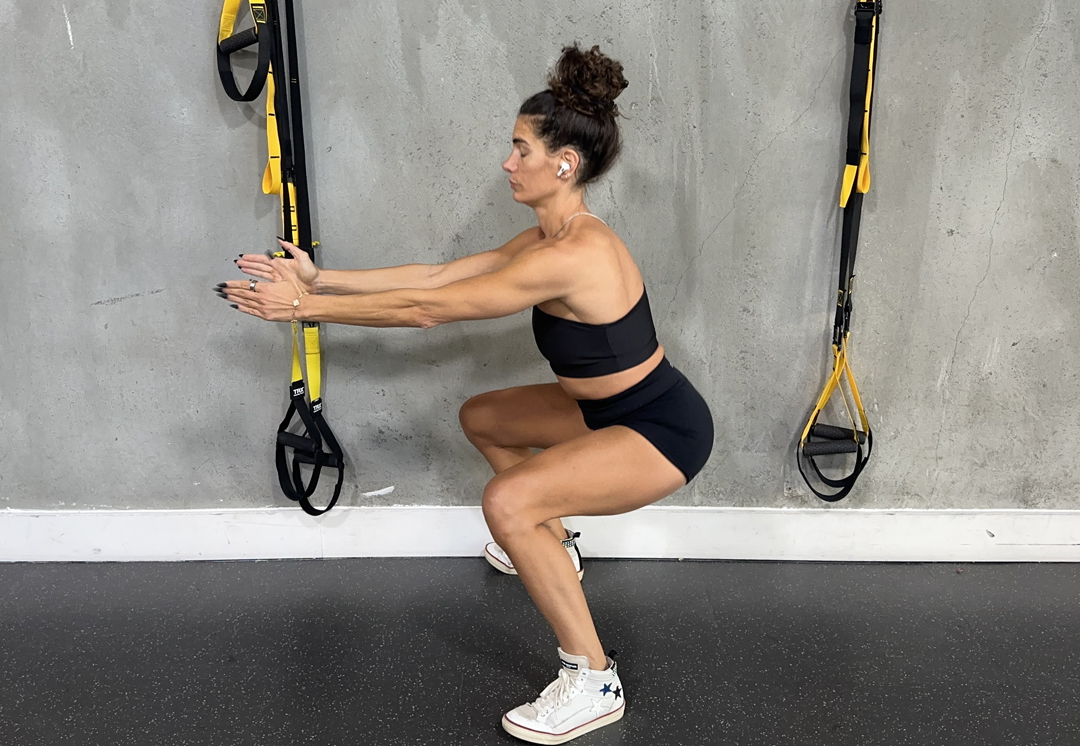By Coach Amanda Hart

Let’s talk about strength training after menopause. The focus is often on weight loss, but we should prioritize building strength, improving bone density, and creating sustainable healthy habits. These are the cornerstones of well-being during this life stage, with improved body composition being a beneficial side effect, not the primary goal. Strength training effectively addresses these needs, empowering the body and enhancing the overall quality of your life.
Why Strength Training is Crucial after Menopause
Menopause brings hormonal shifts leading to decreased bone density (Osteoporosis), muscle loss (Sarcopenia), and a slower metabolism. Strength training directly counters these changes by providing:
- Stronger bones: Weight-bearing exercises stimulate bone growth, reducing fracture risk.
- Increased muscle mass: Building muscle boosts metabolism, aiding weight management and increasing energy.
- Improved balance and coordination: Strength training enhances stability, reducing fall risk.
- Enhanced mood and cognitive function: Exercise releases endorphins, improving mood and potentially cognitive function.
- Better Sleep: Regular activity contributes to better sleep quality.

Sample Workout Routine (Beginner-Friendly):
This routine is adaptable to your fitness level. Always consult your doctor before starting any new exercise program. Aim for 2-3 sessions per week with rest days in between. As you get stronger, gradually increase the weight, reps, or sets each week. This is called progressive overload. Ideally, you want to be increasing your weight by 2.5 pounds every 2-4 weeks.. If increasing weight is not an option, remember you can also increase reps to continue to keep your body challenged. Make sure to reassess your program every 4-6 weeks and consider working with a certified personal trainer, like myself for personalized guidance.
- Warm-up (5-10 minutes): Light cardio like jogging, a brisk walk or cycling works well here.
Note: Perform exercises (3 sets of 10-12 repetitions each. Make sure you choose a weight that is challenging enough for you by 12 reps).
- Sumo Squats: Works legs and glutes. Focus on the proper form by keeping your back straight, chest up, and feet outside your hips. Then lower until your thighs are parallel to the ground. Drop hips down to ninety degrees then come back up to a standing position. That’s one rep.
- Negative Push-ups: Works chest, shoulders, and triceps. Maintain a straight line from head to heels (or knees). Lower your chest down to the ground and come back up in one swift motion using your knees. For beginners, you can do wall pushups instead of negative push-ups.
- DB Row on bench or chair: trains back and biceps. Keep your back straight and pull the weight towards your chest, squeezing your shoulder blades together. Make sure your chest is parallel to the bench. You can also do this exercise standing with a band.
- Plank: Works core muscles. Maintain a straight line from head to heels, engaging your core. Hold the movement on your forearms and brace your core by tucking your pelvis under.
- Forward lunges: Works legs and glutes. Keep your front knee behind your toes and your back straight. Walk forward while maintaining your chest upright and keep your balance intact. If the walking is too challenging, stay stationary and bend your knees down to the ground while standing back up.
Cool-down (5-10 minutes): Stretching like a cobra or pigeon pose is recommended. Hold each stretch for 20-30 seconds.
Nutrition Recommendations
Focus on a balanced diet rich in protein, calcium, and vitamin D to support muscle growth and bone health. Fiber intake is also extremely important for post-menopausal women and you should be aiming for 20-25g of fiber per day to maintain proper gut health and to assist with weight management.
Additionally, adequate hydration is crucial for postmenopausal women. Individual needs may vary but should be aiming for 2 liters of water a day. Remember, you should be prioritizing nutrient density over strict calorie counting and include 3-4 oz. of a lean protein source, ½ cup of a complex carb, and 1-2 servings of green vegetables at every meal.
Sample Day of Eating (Focus on portion sizes and food groups):
- Breakfast: Greek yogurt (1 cup) with berries (1/2 cup), chia seeds, and almonds (a handful).
- Mid-morning Snack: Fruit (apple, banana, or orange) with ¼ cup of walnuts (or a small handful).
- Lunch: Large salad with grilled chicken, or fish-like sardines (4-6 oz.), mixed greens, various vegetables, and a light vinaigrette.
- Afternoon Snack: 1 Hard-boiled egg and 6 whole-wheat crackers or ½ cup of cottage cheese with a sliced peach.
- Dinner: Baked salmon (4-6 oz.) with 1 cup of roasted vegetables (broccoli, carrots, Brussels sprouts) and ¼ cup of quinoa.
- Evening Snack (Optional): A handful of berries or 2-3 squares of dark chocolate (70% cacao or higher).
Remember to aim for adequate protein intake (around 100g per day or 0.8-1g per kilogram of body weight, although this varies from person to person). Good sources of protein include lean meats, poultry, fish, eggs, dairy, beans, and lentils. Some of my favorite complex carbohydrates consist of sweet potatoes, brown rice, fruit, and quinoa. One should be aiming for 100-145g of carbohydrates per day. Try your best to eat a whole, balanced meal with plenty of protein and at least one serving of carbohydrates, especially at your pre and post-workout meals!
Stress management
Prioritize stress management to optimize your training and get the best results possible. A practical place to start managing stress starts with your sleep! You should aim for 7-9 hours a night and practice stress management techniques such as meditation, yoga, or breath work and nurturing social connections. These factors contribute significantly to your overall well-being which will ultimately support your strength training routine and your physique. When you master all of these pillars of your health, the result will be improved physical strength, body composition, and a profound sense of well-being, confidence, and vitality throughout this beautiful life stage.
Sources:
https://my.clevelandclinic.org/health/diseases/21837-postmenopause
https://www.webmd.com/menopause/health-after-menopause
https://www.sciencedirect.com/topics/medicine-and-dentistry/postmenopause
https://www.healthline.com/health/menopause/postmenopausal-health
About the author:
Amanda Hart has 16 years of experience as a certified trainer and nutritionist. Her work focuses on addressing health from a holistic perspective, combining strength training with sustainable routines, bio hacking, and the nervous system. She is certified through NASM and works with clients online and in person.
Visit her website at www.amandahartwellness.com to schedule a FREE consultation with her today!